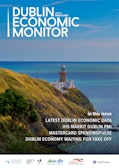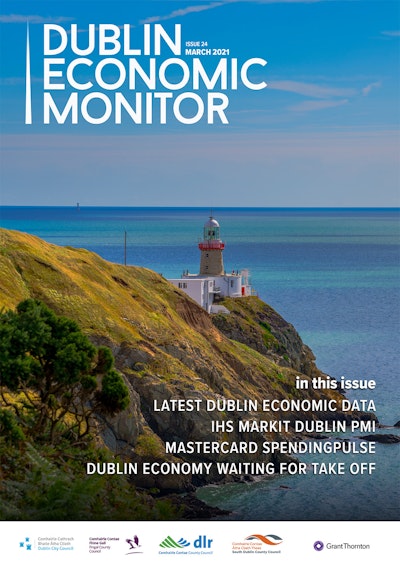The latest Dublin Economic Monitor (DEM), published this morning by the four Dublin Local Authorities, shows that although the Dublin economy remains severely impacted by Covid-19, it is prepared for recovery once conditions permit.
Dublin’s IHS Markit Purchasing Managers’ Index (PMI) showed a decline in business activity in Q4 2020 as both new orders and employment levels reduced. The services sector was the main contributor to this decline with its PMI dipping to 48.0 in the quarter, thus critically crossing the 50 mark which separates growth from contraction. The overall PMI for the Capital stood at 49.2, down from 51.2 in Q3 2020.
According to data from MasterCard, retail spending in the Capital fell by 4.8% QoQ in Q4 2020, but remained 1% above the same quarter in 2019. The main driver of this YoY increase was eCommerce (+44%), though both Entertainment (-70.1%) and Discretionary (-47.2%) spending remained at exceptionally low levels compared to a year previous.
The labour market in the Capital continued to be decimated in late 2020 and in to 2021. Employment levels amongst Dublin residents fell to below 692,000 in Q4 2020 with especially sharp contractions in the services and construction sectors – undoubtedly related to the Level 5 restrictions imposed in the quarter. Pandemic Unemployment Payment recipients swelled to over 148,000 in January as restrictions continued, while the latest data from Indeed shows that job postings in Dublin remained down by over 30% YoY in February.
In the housing market, transaction levels remained low and prices continued on an upward trajectory at the tail end of 2020. Notably, house completion levels reached a new peak in Q4 2020, though there is evidence that supply in the form of commencements is drying up.
Transport and travel around the Capital continued to be significantly affected by the pandemic. Public transport usage was down by over 57% YoY in Q4 2020, while traffic volumes on eight main thoroughfares in Dublin dropped by 41.1% YoY in February. Dublin Airport passenger volumes plummeted by over 91% to 720,000 in Q4, but Dublin Port’s throughput levels surged to over 10 million tonnes in the quarter as both imports and exports increased substantially.
The Dublin Economic Monitor is produced by Grant Thornton on behalf of the four Dublin Local Authorities to provide timely, reliable data and commentary on the economic landscape of the Dublin region. It covers 18 key indicators, consumer spending data from the MasterCard SpendingPulse™ and provides regular insights into different aspects of Dublin’s economy.


